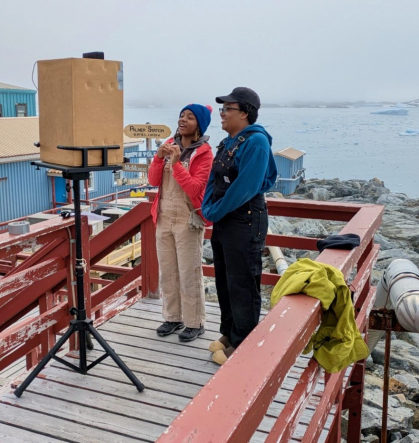The innovative program connects students with researchers in the Antarctic, inspiring a love of science
Wearing overalls, layered sweatshirts, and a knit cap to fend off the chilly weather, Rutgers biological oceanographer Mya Sharpe stood on a deck of Palmer Station on Anvers Island near the Antarctic Peninsula, broadcasting live to students, some more than 6,000 miles away. As the wind whipped, she fielded their questions: "Have you ever seen penguin siblings fight for food?" "How does bird flu affect the penguins?" "What can we do here that will slow or stop ice melt there?"
Over six weeks, more than 725 students from 27 schools and youth clubs across the country stepped into a virtual portal to one of the planet's most remote places. Through the Palmer Long-Term Ecological Research (LTER) Live Video Teleconference (VTC) series, they connected with polar scientists in real time, gaining a front-row seat to climate research.
Organized by Rutgers University's Department of Marine and Coastal Sciences (DMCS), the VTC series doesn't just transport students to Antarctica, it empowers them to see themselves as future scientists and climate advocates, said Janice McDonnell, STEM Agent with the Department of 4-H Youth Development at Rutgers.
Sharpe was joined by Maya Thomas of Virginia Institute of Marine Science and Abby Tomita of Oregon State University. The scientists livestreamed from the station's rocky outcropping along the Western Antarctic Peninsula, answering students' questions about what it takes to work in such an extreme environment.

The students' biggest surprise? It was summer in Antarctica, so there was less snow than they expected.
Sharpe understands the power of curiosity. As a child, with limited access to the ocean, she dug makeshift tidal pools on family beach trips. Today, she studies how retreating glaciers affect phytoplankton blooms - microscopic organisms that form the base of the Antarctic food web and, ultimately, impact global food systems.
Connecting Real-Time Research with Data Literacy
The VTC series ties directly into an educational initiative called "Data to the Rescue: Penguins Need Our Help!" The eight-week program, created by Rutgers' DMCS and 4-H NJ Cooperative Extension, gives students a hands-on introduction to polar research.
Students plan an Antarctic expedition, assemble a research team, collect and analyze data, and communicate scientific findings. Using a mix of online learning activities, postcards, and guided lessons, participants finish the program with a deeper appreciation for scientific research, and greater confidence in their own potential to pursue STEM careers.
A Lasting Impact
Educators who participated in the VTC series called the experience powerful.
"The opportunity for our Science Rocks 4-H Club to participate in real-time, real-data science exploration was a first for us, and so exciting," said Linda Horner, Cape May County 4-H program coordinator. "Even our youngest kindergartners felt immersed in Antarctica's austere, spectacular world and became deeply concerned about the fate of the Adélie penguin."
Andi Twiss, a middle school science teacher in Minnesota, said the experience was transformative for her students, and for her own career. "I have watched my scholars shift their mindset from 'student' to 'scientist,'" Twiss said. "I see them understand their own capacity for learning a little bit differently after a scientist in the field takes the time to answer their question! It's so powerful!"
Inspired by the VTC program, Twiss recently became an educator at Palmer Station through Polar STEAM, where she'll help students explore Antarctic research in even greater depth.
"I was able to refer to my direct experience with this Palmer LTER work when interviewing for Polar STEAM," she explained. "Now I get to connect my students even more to this pivotal part of the planet and help answer their many scientific inquiries."
'What Can We Do to Help?'
Inevitably, every VTC session ends with the same urgent question: What can we, as students in the U.S., do to help Antarctica?
Researchers emphasize that students have power, by learning about science, sharing what they discover with others, and becoming voters. The more people understand the impact of climate change, the greater the chance of action.
Learn More
The Palmer LTER VTC series and Data to the Rescue program equip students with knowledge and confidence to pursue science and become part of the solution, McDonnell said. Learn more about the LTER VTC calls here. Interested in Data to the Rescue? You can purchase the education kit here.
Mitaali Taskar is a science communicator and research project assistant with Rutgers Department of Marine & Coastal Sciences, School of Environmental & Biological Sciences.






